Sir Peter James Donnelly is an Australian-British mathematician and Professor of Statistical Science at the University of Oxford, and the CEO of Genomics PLC. He is a specialist in applied probability and has made contributions to coalescent theory. His research group at Oxford has an international reputation for the development of statistical methodology to analyze genetic data.
Hans Charles Freeman AM, FAA was a German-born Australian bioinorganic chemist, protein crystallographer, and professor of inorganic chemistry who spent most of his academic career at the University of Sydney. His best known contributions to chemistry were his work explaining the unusual structural, electrochemical, and spectroscopic properties of blue copper proteins, particularly plastocyanin. He also introduced protein crystallography to Australia and was a strong advocate for programs to ensure Australian scientists have good access to "big science" facilities. Freeman has received numerous honours, including being elected a Fellow of the Australian Academy of Science (FAA) and appointed a Member of the Order of Australia (AM) by the Australian Government. He was a charismatic lecturer who voluntarily continued teaching well into his formal retirement and imbued his students with a love of science.
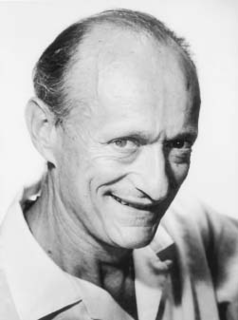
Stephen William Kuffler was a pre-eminent Hungarian-American neurophysiologist. He is often referred to as the "Father of Modern Neuroscience". Kuffler, alongside noted Nobel Laureates Sir John Eccles and Sir Bernard Katz gave research lectures at the University of Sydney, strongly influencing its intellectual environment while working at Sydney Hospital. He founded the Harvard Neurobiology department in 1966, and made numerous seminal contributions to our understanding of vision, neural coding, and the neural implementation of behavior. He is known for his research on neuromuscular junctions in frogs, presynaptic inhibition, and the neurotransmitter GABA. In 1972, he was awarded the Louisa Gross Horwitz Prize from Columbia University.
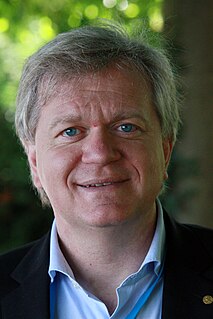
Brian Paul Schmidt is the Vice-Chancellor of the Australian National University (ANU). He was previously a Distinguished Professor, Australian Research Council Laureate Fellow and astrophysicist at the University's Mount Stromlo Observatory and Research School of Astronomy and Astrophysics. He is known for his research in using supernovae as cosmological probes. He currently holds an Australian Research Council Federation Fellowship and was elected a Fellow of the Royal Society (FRS) in 2012. Schmidt shared both the 2006 Shaw Prize in Astronomy and the 2011 Nobel Prize in Physics with Saul Perlmutter and Adam Riess for providing evidence that the expansion of the universe is accelerating, making him the only Montana-born Nobel laureate.
Lisa Jennifer Kewley is a Professor and Director of the ARC Centre of Excellence for All Sky Astrophysics in 3-D and ARC Laureate Fellow at the Australian National University College of Physical and Mathematical Sciences. Specialising in galaxy evolution, she won the Annie Jump Cannon Award in Astronomy in 2005 for her studies of oxygen in galaxies, and the Newton Lacy Pierce Prize in Astronomy in 2008. In 2014 she was elected a fellow of the Australian Academy of Science. In 2020 she received the James Craig Watson Medal. In 2021 she was elected as an international member of the National Academy of Sciences. In 2022 she became the first female director of the Center for Astrophysics | Harvard & Smithsonian.

Matthew England is a physical oceanographer and climate scientist. He is currently Scientia Professor of Ocean & Climate Dynamics at the University of New South Wales, Sydney, Australia.

Gary Taubes is an American journalist, writer, and low-carbohydrate / high-fat (LCHF) diet advocate. His central claim is that carbohydrates, especially sugar and high-fructose corn syrup, overstimulate the secretion of insulin, causing the body to store fat in fat cells and the liver, and that it is primarily a high level of dietary carbohydrate consumption that accounts for obesity and other metabolic syndrome conditions. He is the author of Nobel Dreams (1987); Bad Science: The Short Life and Weird Times of Cold Fusion (1993); Good Calories, Bad Calories (2007), titled The Diet Delusion (2008) in the UK and Australia; Why We Get Fat: And What to Do About It (2010); The Case Against Sugar (2016); and The Case for Keto: Rethinking Weight Control and the Science and Practice of Low-Carb/High-Fat Eating (2020). Taubes's work often goes against accepted scientific, governmental, and popular tenets such as that obesity is caused by eating too much and exercising too little and that excessive consumption of fat, especially saturated fat in animal products, leads to cardiovascular disease.
Michael Cowley FTSE is an Australian physiologist. He is best known for his mapping of the neural circuits involved in metabolism and obesity and diabetes treatment. He is a professor in the Department of Physiology at Monash University in the Faculty of Biomedical and Psychological Sciences. He is also a director of the Australian diabetes drug development company, Verva Inc, and director of the Monash Obesity & Diabetes Institute] (modi).

Nalini Joshi is an Australian mathematician. She is a professor in the School of Mathematics and Statistics at the University of Sydney, the first woman in the School to hold this position, and is a past-president of the Australian Mathematical Society. Joshi is a member of the School's Applied Mathematics Research Group. Her research concerns integrable systems. She was awarded the Georgina Sweet Australian Laureate Fellowship in 2012. Joshi is also the Vice-President of the International Mathematical Union, and is the first Australian to hold this position.

Benjamin John Eggleton FAA, FTSE, FOSA, FIEEE is the Director of The University of Sydney Nano Institute. He also currently serves as Co-Director of the NSW Smart Sensing Network (NSSN).
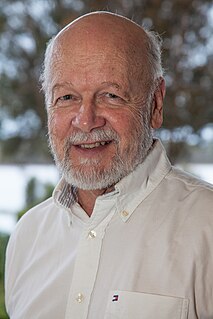
Richard Shine is an Australian evolutionary biologist and ecologist; he has conducted extensive research on reptiles and amphibians, and proposed a novel mechanism for evolutionary change. He is currently a Professor of Biology at Macquarie University, and an Emeritus Professor at The University of Sydney.
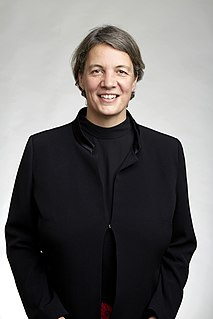
Michelle Yvonne Simmons, is a Scientia Professor of Quantum Physics in the Faculty of Science at the University of New South Wales and has twice been an Australian Research Council Federation Fellow and is an Australian Research Council Laureate Fellow. She is the Director of the Australian Research Council Centre of Excellence for Quantum Computation & Communication Technology and is recognised internationally as the creator of the field of atomic electronics. She was the inaugural editor-in-chief of npj Quantum Information, an academic journal publishing articles in the emerging field of quantum information science. On 25 January 2018, Simmons was named as the 2018 Australian of the Year for her work and dedication to quantum information science. On 10 June 2019, Simmons was appointed an Officer of the Order of Australia (AO) in the 2019 Queen's Birthday Honours in recognition of her "distinguished service to science education as a leader in quantum and atomic electronics and as a role model."

Tanya Mary Monro FOSA FAIP GAICD is an Australian physicist known for her work in photonics. She has been Australia's Chief Defence Scientist since 8 March 2019. Prior to that she was the Deputy Vice Chancellor, Research and Innovation (DVCR&I) at the University of South Australia. She was awarded the ARC Georgina Sweet Australian Laureate Fellowship in 2013. She was the inaugural chair of photonics, the inaugural director of the ARC Centre of Excellence for Nanoscale Biophotonics and the inaugural director of the Institute for Photonics & Advanced Sensing (IPAS), and the inaugural director of the Centre of Expertise in Photonics (CoEP) within the School of Chemistry and Physics at the University of Adelaide. Monro has remained an adjunct professor of physics at the University of Adelaide following her departure from the institution.

Professor Jennifer Louise "Jenny" Martin is an Australian scientist, academic, and was recently the Deputy Vice-Chancellor at the University of Wollongong, in New South Wales. She is a former Director of the Griffith Institute for Drug Discovery at Griffith University. and a former Australian Research Council Laureate Fellow at the Institute for Molecular Bioscience, University of Queensland. Her research expertise lies in the areas of structural biology, protein crystallography, protein interactions and their applications in drug design and discovery.

Aseem Malhotra is a British cardiologist, public health campaigner, author of several books, and writer of articles in newspapers. He campaigns for people to reduce sugar in their diet, to promote a low carb, high fat diet and to reduce the overprescribing of medicines. He was the first science director of Action on Sugar in 2014. He has been listed as one of The Sunday Times 500 most influential people and was twice recognized as one of the top 50 black and minority ethnic (BME) community member pioneers in the UK National Health Service by the Health Service Journal. He is co-author of a book called The Pioppi Diet.
Marcela Bilek is a Professor of Applied Physics and Surface Engineering at the University of Sydney, Australia. Her research interests focus on the use of plasma related methods to synthesise thin film materials and modify surfaces and interfaces. She was named Fellow of the American Physical Society in 2012 and Fellow of the Institute of Electrical and Electronics Engineers (IEEE) in 2015 for contributions to the science and application of plasma processes for materials modification and synthesis. Among her many awards are the Malcolm-McIntosh Prize for Physical Scientist of the Year in 2002 and the Pawsey Medal awarded by the Australian Academy of Science in 2004.
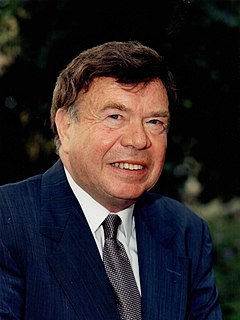
Alan Howard was an English nutritionist. His research interests were in the field of nutrition, initially in the nutritional relationships associated with coronary heart disease and the treatment of obesity and later into eye and brain nutrition. His inventions and patents related to very-low-calorie diets enabled him to establish the Howard Foundation. He died peacefully on 24 June 2020 in his holiday home in Cannes, France.
Christopher Barner-Kowollik FAA, FQA, FRSC, FRACI is an Australian Research Council (ARC) Laureate Fellow, the Deputy Vice-Chancellor Research and Vice-President of the Queensland University of Technology (QUT) and Distinguished Professor within the School of Chemistry and Physics at the Queensland University of Technology (QUT) in Brisbane. He is the Editor-in-Chief of the Royal Society of Chemistry (RSC) journal Polymer Chemistry, a principal investigator within the Soft Matter Materials Laboratory at QUT and associate research group leader at the Karlsruhe Institute of Technology (KIT).
Kaarin Anstey is an Australian Laureate Fellow and one of Australia's top dementia scientists. She is Co-Deputy Director of the ARC Centre of Excellence in Population Ageing Research (CEPAR) at the University of New South Wales, Australia, where she is Scientia Professor of Psychology. Kaarin Anstey is an Honorary Professor at the Australian National University and a Fellow of the Academy of the Social Sciences in Australia. She is a Director of the NHMRC Dementia Centre for Research Collaboration, Senior Principal Research Scientist at NeuRA and leads the NHMRC Centre of Research Excellence in Cognitive Health and the UNSW Ageing Futures Institute.
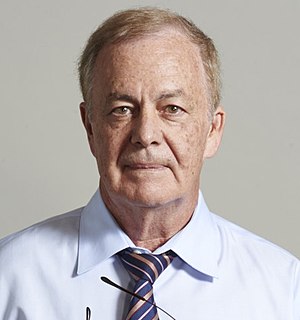
Robert Michael Graham AO, FAA, FAHMS is an Australian-born clinician-scientist. He is the Des Renford Professor of Medicine at University of New South Wales and the Head of the Molecular Cardiology and Biophysics Division at Victor Chang Cardiac Research Institute.













